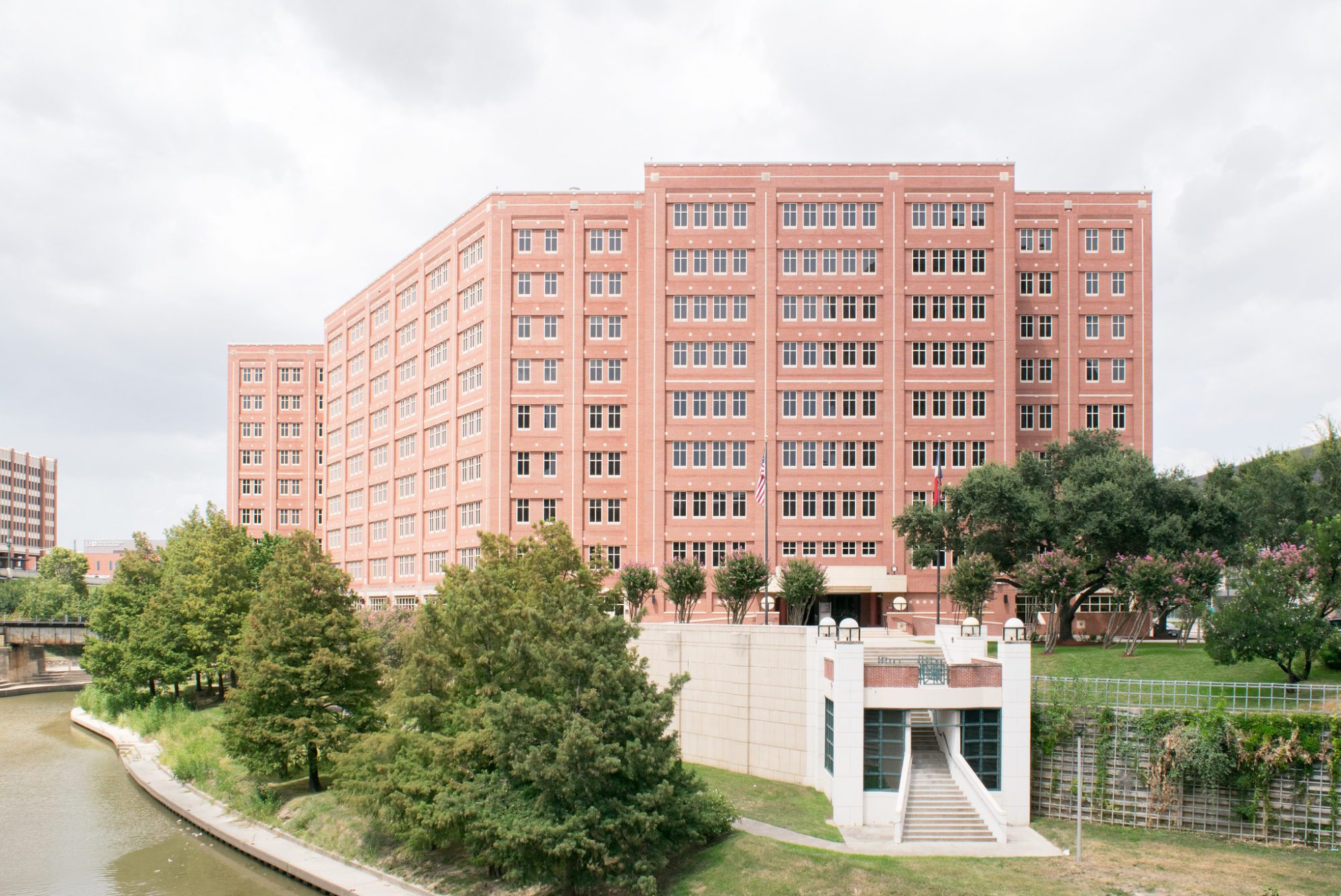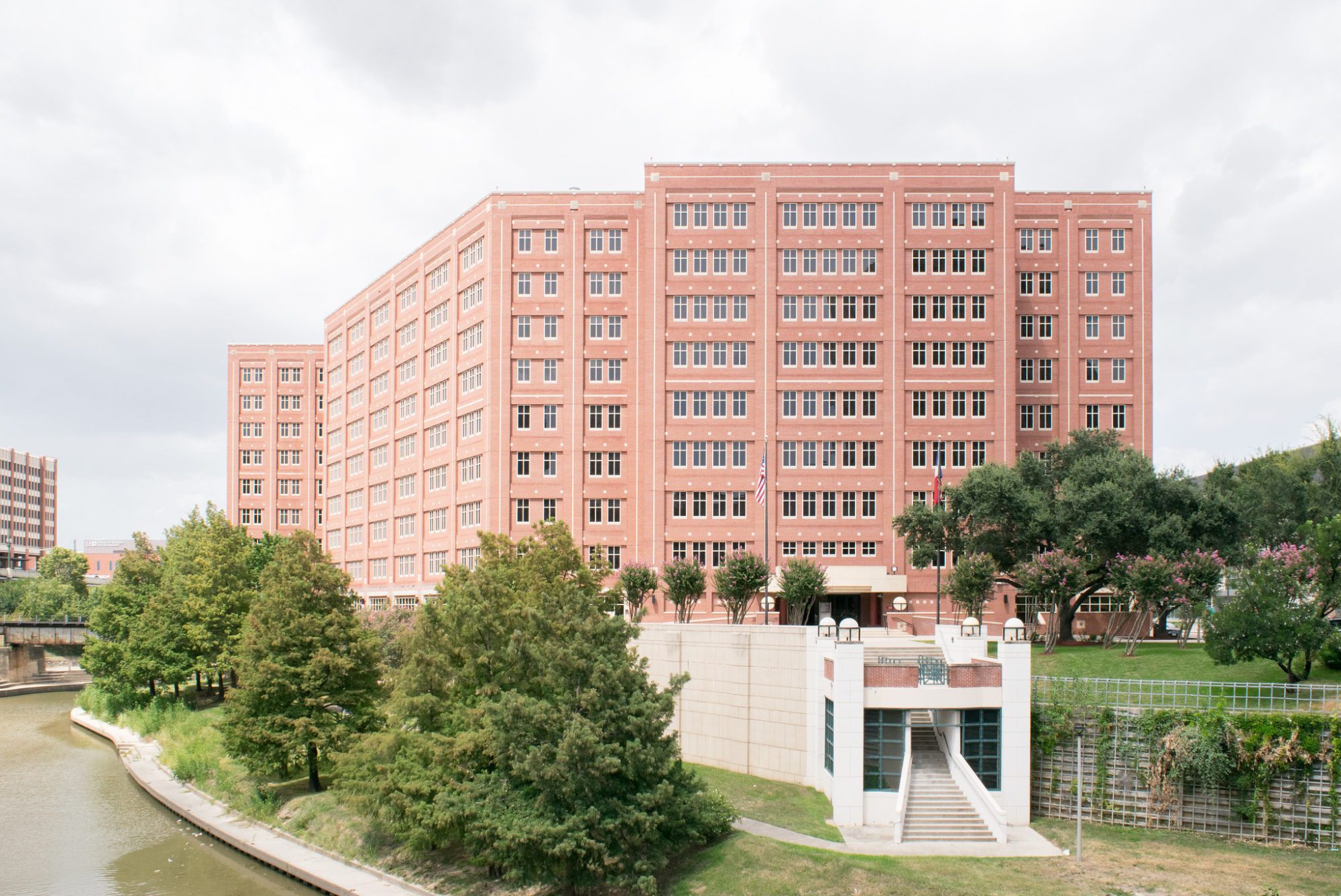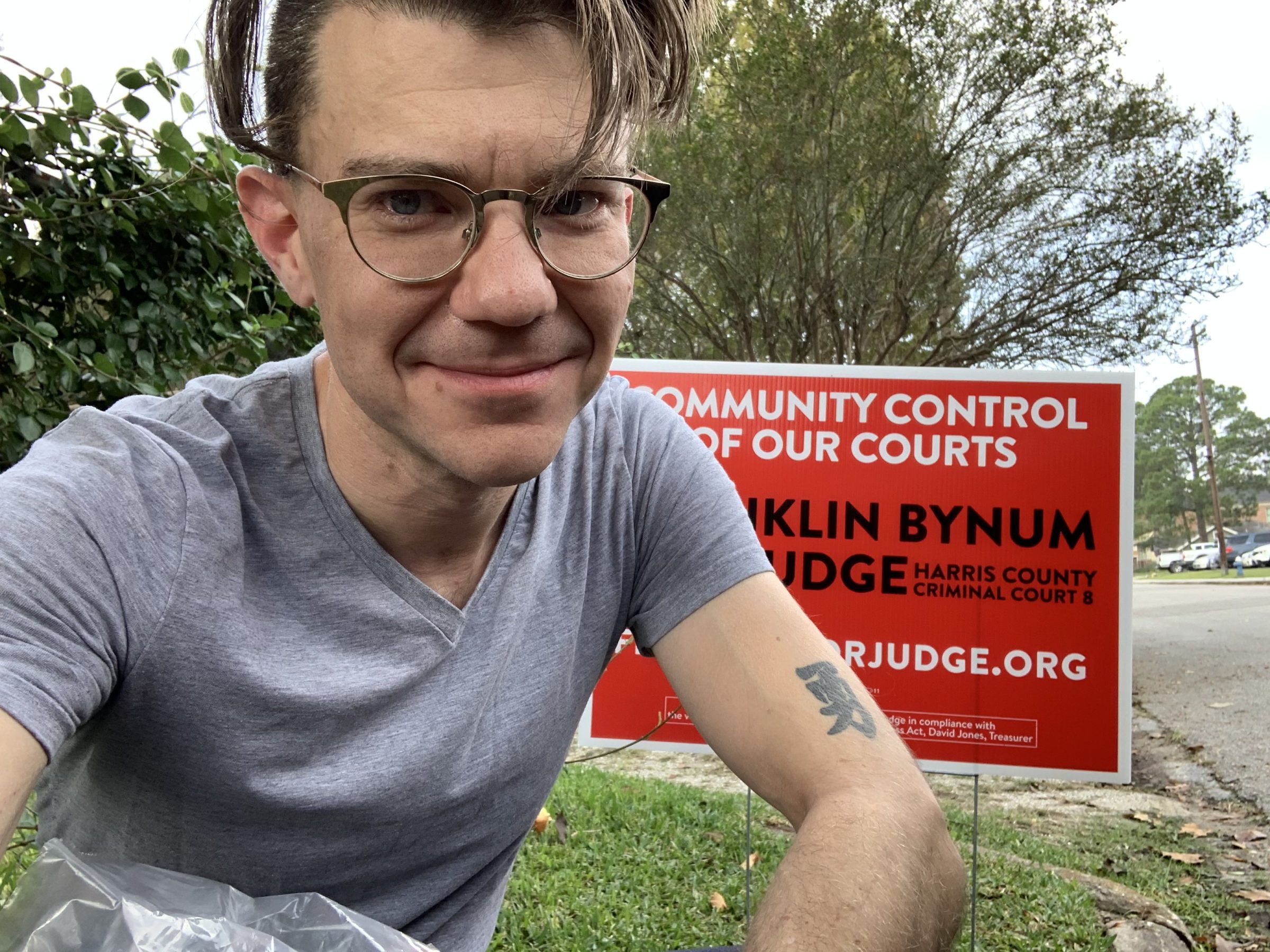Decarcerating from the Bench
“We had a real clear strategy about how to change the system and what tools we were going to use, and we did it.”
Michael Barajas | March 7, 2022


Franklin Bynum says he first ran to be a criminal court judge in 2018 because he saw a golden opportunity for reform in Texas’s largest county. A federal court in Houston had just declared Harris County’s bail practices unconstitutional because poor people were routinely detained for petty charges, but county judges were blocking change. Bynum, a democratic socialist and former public defender, says he wanted to help build another system. He and other reform-minded candidates defeated the incumbents, came into office, and helped usher in systemic changes that reduced pretrial detention for misdemeanor charges.
Bynum lost his re-election bid last week to Erica Ramirez, an assistant district attorney in the Harris County DA’s office. Ramirez was one of nine prosecutors running for judge in the Democratic primaries who have worked under DA Kim Ogg, who has opposed recent reforms. Five of those prosecutors lost, three won, and a ninth faces an incumbent in a May runoff. These mixed results come with Harris County at a crossroads. While police and prosecutors blame bail reforms, without evidence, on a pandemic-era spike in violent crime, reformers continue to push for change to reduce crowding at the local jail.
Bolts spoke with Bynum shortly after the primary about the lessons he draws from his time as a judge about reforming from the bench, the future of policies to decarcerate in Harris County, and how the left should approach judicial elections. Progressives have sought to flip the bench in a series of places recently, from New Orleans to Las Vegas. “There should be hundreds of similar efforts across the country,” he says. “There’s a lot of concrete gains you can make.”
How are you feeling after the election?
I am really disappointed, of course, but upon some reflection, I know that I’ve accomplished everything in the job that I set out to accomplish. There is more to be done, but I’m really proud of the progress we made. The most important thing was settling the bail lawsuit with a very strong consent decree and federal monitor. We made structural changes to end unlawful detention practices that are not going to be easily rolled back. We also implemented a cite-and-release court, which the county had never done before. The other huge thing was taking court appointments out of the hands of judges, which was an incredibly corrupt system, and putting them into the hands of an independent office that has greater resources. [Editor’s note: the judges revamped how lawyers are assigned for indigent defendants.]
I would have loved to stay on and see these changes through and improve upon them—that’s what I was asking voters for. But I also know that I’m leaving a job that ruins people, where I have seen people become corrupted and compromise their integrity. I’m really proud to have come in and done what we have, and to leave with my integrity intact.
Some of your opponents framed these elections as a test for bail reform. How do you respond to your loss in that context?
Ultimately I take full responsibility for the result in my race. However, if you look at most of the DA challengers, they failed. If you look at the results in the Democratic primary, it’s also largely identity-driven results. I don’t think it’s a repudiation of our reforms because there were resounding wins from colleagues of mine that are just as strong proponents of what we did here. I’m sure the opposition would love to make me a poster child, but that’s not what happened.
What has your time on the bench taught you about the importance or difficulty of reforming the criminal legal system from the inside?
I was really inspired to run by the bail litigation. At the time, there was a preliminary injunction that basically destroyed the old system, and I knew that a new system would be built in its place. From the beginning, we had a real clear strategy about how to change the system and what tools we were going to use, and we did it. Federal courts, I think, are better historically at disrupting systems of oppression on a temporary basis, but then they’re really bad at supervising and implementing a long term remedy—because really, that takes a political follow through. Look at the integration of schools.
So there are significant changes that can be made with an inside-outside kind of strategy: coming in as an outsider and making changes inside, lasting changes that change the culture. On top of all I was talking about with the structural stuff we did, there’s a lot of soft power, the daily practice that can change what courts look like and how they feel to people.
On the whole, my real feeling right now is that probably the biggest impediment to using electoral projects to achieve lasting structural change to systems of oppression is the Democratic Party itself. So many of the prosecutors running in the Democratic primary, I can’t differentiate their politics from someone on the pretty far right. The party effectively just doesn’t have the wherewithal for some reason to enforce some discipline around consolidating gains in an electoral way.
I think that another reason why I’m something of a target is that I understand the rules very well and I know they allow me to say lots of different things that other judges just don’t want to say. I think in some ways, judicial races are the perfect races for Democrats, because Democrats don’t want to say anything in general. In judicial races, they can just claim there’s a rule against saying anything or standing on any principle, but that’s not true. The people who previously presided over the courts often made public statements about being tough on crime.
One big critic has been the local DA, who’s also a Democrat and who you’ve openly clashed with. What’s her role in the local narrative around these pretrial reforms?
To answer the question I kind of have to take a step back and talk structurally. I am in favor of electing judges, especially criminal court judges, because it’s really important to have local control over police and prosecutors. That’s why we elect local district attorneys and don’t have consolidated statewide prosecutor’s offices for the most part. There’s some sense that it’s important to locally control these powers.
I think that the reason the DA has so publicly clashed with many of us is that we came in, as elected judges, and we turned the position from this perversion that it had become—which was basically just a rubber stamp for the worst practices on a daily basis—to actually providing robust oversight of police and prosecutors. And prosecutors were very upset about it.
What about the role of local media in the narrative around pretrial reforms? A recent analysis of coverage said local media helped construct a “distorted narrative” that exaggerated the risks of pretrial reforms while minimizing their positive impact.
It’s really local broadcast news that does this huge public disservice. We have the largest Crime Stoppers organization in the country here in Houston. They have a huge building down on Main Street, and it’s actually named after a longtime local news anchor. Crime Stoppers describes the local news as their partners, when really, they are a political advocacy organization. So it’s this kind of toxic mix of lazy local news segment producers that have this pipeline of fresh stories pumped out by the Crime Stoppers PR machine. The world that I see on the local news just has no relation to the world that I see in the courtroom and the world that I live in and the community that I live in. I think that we forget that the airwaves are ours, they don’t belong to Sinclair or Tegna.


You’re a democratic socialist who ran on an explicitly decarceral agenda: How did those values guide your approach on the bench?
One of the rallying cries was, “people need care, not cages.” In a misdemeanor court in particular, most of the cases that I’ve seen on a daily basis for over three years, people were there because they weren’t getting something they needed. When I’m seeing people for the first time at an arraignment, when I’m trying to see if any conditions for release are necessary—or in the rare case that someone is detained, having a detention hearing about whether they can be safely released—the number one thing that comes up with people every day is housing. It’s so often that if someone had a place to go, if they had a different place to go, if they had really any place to go at all, then this whole expensive, formal court process never would have been necessary. I mean, you wouldn’t believe how many cases you see involving shoplifting for food or baby formula. It’s people who aren’t getting what they need, who are suffering, and also to a large extent are living in communities that are being targeted by police. What is all this pain and cruelty for? This formal process of detaining someone and all the money we spent—what good was it doing?
Coming in with this decarceral approach, I just see a lot of this process as an inadequate, cruel response to larger social problems. The system has these broad promises, like the presumption of innocence, the high burden the state has to meet and all that, but it often falls short.
Now that we’re not all just rubber stamps for prosecutors, we’ve removed a lot of the coercion that was driving the guilty plea mill here—like detaining people just because they couldn’t afford to pay. But we also stopped revoking people’s bond because they were five minutes late and petty reasons like that. We stopped making them appear in court so much and just wrecking people’s lives with unnecessary obligations. [Editor’s note: In 2015 and 2016, roughly one third of all misdemeanor cases ended in a dismissal or acquittal in Harris County. For misdemeanor cases filed in 2019, about two-thirds did.]
What is the future for pretrial reforms to reduce detention in Harris County? How much responsibility do judges bear for the crowding and dangerous conditions that persist for people in the local lockup?
The jail is just as full as it ever has been, and it’s largely felonies. I don’t think I have anyone detained right now, because in the rare case that I make the requisite findings to detain someone and provide the requisite process, that person gets a trial within like two weeks. I know that’s not possible in all felony cases, but the thing is, there’s some fundamental untruth about the differentiation between misdemeanors and felonies. A huge, huge proportion of felonies that are pending are actually misdemeanor level conduct that are then subject to this crazy word that we use, “enhanced.” So a third theft, even stealing a candy bar, can be a felony. People like that are still being detained en masse by the (felony) district courts. Ultimately, it’s the responsibility of the DA, who just has consistently refused to exercise discretion.
What do you think others with a similar outlook should take away from your win in 2018, and your loss this year—about whether to run, whether it’s worth it, what to expect if you do?
I think that there should be hundreds of similar efforts across the country. There’s a lot of concrete gains you can make. Having run in leftist circles my entire adult life, I find that there’s often a real hesitancy to dig in and do the work and forge coalitions. I mean, one of my best working partners here has been the sheriff, Ed Gonzalez, who is outstanding and who went to the mat to support these reforms. We shouldn’t be afraid as leftists to engage with the system and wield power, it is not compromising in and of itself to do that. We can make concrete material gains for many, many people in our community.
One of my hopes moving forward is that I’ll finally have time to collect my notes and thoughts, and then I’ll get to talk to people about how to do it. I still believe in the project and I believe in building upon these gains. And ultimately I really believe in the courts.
I believe society needs courts as a method of dispute resolution, an attempt to put systemic fairness into action. Even though courts have failed for generations to do that right, the promise is still really great. And I think that in places where judges are elected, that’s a pathway for making the systemic changes that are needed to deliver on that promise.
This interview has been edited for length and clarity.


